Iran Court Sentences Princeton's Mousavian In Corruption Case
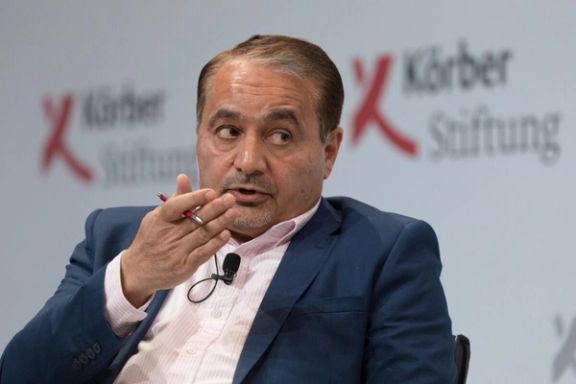
A former Iranian diplomat who is currently a Princeton University scholar has been sentenced to 11 months in prison over his role in a corruption case in Iran.

A former Iranian diplomat who is currently a Princeton University scholar has been sentenced to 11 months in prison over his role in a corruption case in Iran.
Iranian Judiciary Spokesman Zabihollah Khodayian said on Monday Hossein Mousavian was an advisor in a €2-billion case in the Persian Gulf island of Kish in the 2000s.
According to Khodayian, Mousavian brokered a deal to give 200 hectares of the island and 100 thousand square meters of its territorial waters to a third party but the resort project was never carried out.
Earlier in January, his remarks in a documentary to mark Qasem Soleimani’s second death anniversary led to controversy when he gloated about how Iran’s threat to avenge Soleimani killing frightened the wife of Brian Hook, Washington’s special envoy for Iran at the time.
Advocacy group United Against Nuclear Iran (UANI) has also called on Princeton “to dismiss him from any association or affiliation with the university without delay”, noting that “Mousavian’s affiliation with Princeton is a stain on the university’s reputation and credibility”.
UANI described him as “an agent of the Iranian regime” who is currently employed as a Middle East and nuclear policy specialist at the university.
Late in December, an American academic who was imprisoned in Iran for 1,216 days, said Mousavian is sympathetic to the Iranian regime, claiming that he stymied efforts to free him from prison.
Mousavian, who traveled to Iran to attend the funeral service of Soleimani, was Tehran’s ambassador to Germany when four Iranian dissidents were assassinated at Berlin's Mykonos restaurant in 1992.
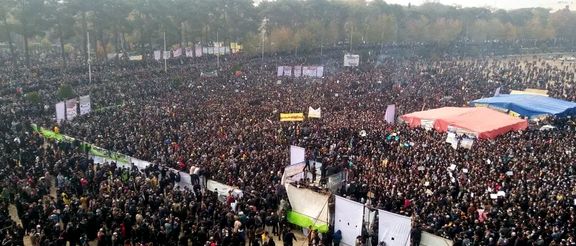
Eleven Iranian opposition groups have urged three European nations participating in nuclear talks with Iran to stop the negotiations with the Islamic Republic.
The letter, which was signed by Western-based secular and liberal groups opposed to the Islamic Republic, addressed the leaders of France, Germany, and the United Kingdom, calling on them to end “the failed and catastrophic policy of negotiating with and appeasing the Islamic Republic”.
They told Emmanuel Macron, Boris Johnson, and Olaf Scholz that the regime with which they are engaged in talks “is the same fundamentalist regime that since its inception 43 years ago, has had terror, hostage-taking, and sabotage, as an integral part of its ideology and nature, and its most important tools for blackmailing the free world”.
Diplomats have said that nuclear talks, which began last April to revive the 2015 nuclear agreement (JCPOA), have made significant progress and a final deal is imminent soon. In case agreement is reached, Iran is set to receive billions of dollars of blocked funds and massive sanctions relief.
The signatories highlighted that the “Islamist revolutionary regime has carried out hundreds of terrorist attacks around world”, emphasizing that it has engaged in killings, bombings, and hostage taking, as well as issuing fatwas (decrees) for murder of innocent people.
This is “the same inhumane, misogynist, and anti-LGBTQ oppressive regime that, despite decades of attempts at dialogue and resolutions by the international community, still enforces medieval Sharia law,” which includes stoning, amputation, and flogging, the letter read.
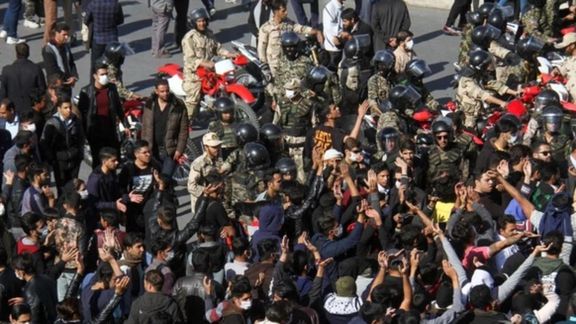
The opposition groups stressed that the clerical government “carries out large-scale executions and imprisonments, often with the aim of suppressing and silencing political opponents”.
The Islamic Republic soon after its establishment cracked down on opposition and independent groups and has continued to ban civil society initiatives. Practically all opposition has been sent into exile or imprisoned.
They criticized the policy of the West, especially Europe, towards “this anti-Semitic regime,” saying “appeasement and the payment of ransoms in order to normalize and attempt to change the behavior of this inherently abnormal regime” have only emboldened it “in its terrorist activities, criminality, and nuclear and military ambitions”.
The signatories highlighted Iran’s track record of “insolence on the international stage and criminal suppression of the people”, stating that “Nearly two decades of counterproductive negotiations and flawed deals such as the JCPOA have only given the Islamic Republic a chance to buy time. By deceiving the international community, it has brought its nuclear and ballistic missile programs to an irreversible stage”.
Then opposition groups called for action, urging the three European powers “to put aside, once and for all, the failed and catastrophic policy of negotiating”, saying that now when the Islamic Republic is at the lowest level of popular legitimacy in its history it “is the time to choose another policy: Maximum support for the Iranian people to end more than four decades of medieval rule and replace it with a secular democratic system that serves Iran's national interests through peaceful coexistence and cooperation with neighbors and all countries in the world”.
“This is the only way to prevent the world's largest terrorist state from achieving the atomic bomb -- a catastrophe that will plunge the entire region into a nuclear arms race”, they wrote.
They asked the European leaders that instead of the Vienna talks they should “enter into a serious and effective dialogue with the democratic and national opposition of Iran, which wants a free and secular Iran”.
“Sooner or later, the Islamic Republic will be overthrown by the brave and courageous people of Iran, and the day after liberation, the Iranian people will remember who stood by them in difficult times and who aided their oppressors”, they concluded.
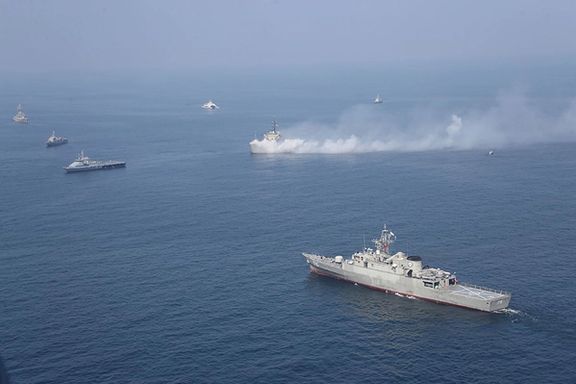
The US Navy's 5th Fleet has announced the launch of a joint force of drone boats with allies to patrol Mideast's volatile waters as tensions simmer with Iran.
Vice Adm. Brad Cooper, who leads the 5th Fleet, told The Associated Press that 100 unmanned drones, both sailing and submersible, would dramatically multiply the surveillance capacities of the US Navy, allowing it to keep a close eye on waters critical to the flow of the global oil and shipping.
Trade at sea has been targeted in recent years as Tehran's nuclear deal with world powers collapsed.
"By using unmanned systems, we can just simply see more. They're high-reliability and remove the human factor," Cooper said on the sidelines of a defense exhibition in Abu Dhabi, adding the systems are "the only way to cover on whatever gaps that we have today."
Cooper said he hopes the drone force would be operational by the summer of 2023 to put more "eyes and ears on the water."
The Bahrain-based 5th Fleet includes the crucial Strait of Hormuz, the narrow mouth of the Persian Gulf through which 20% of all oil passes.
It also stretches as far as the Red Sea reaches near the Suez Canal, the waterway in Egypt linking the Mideast to the Mediterranean, and the Bab el-Mandeb Strait off Yemen.
The high seas have witnessed a series of assaults and escalations in recent years, following former President Donald Trump's decision to pull the United States out of the nuclear deal and reimpose devastating sanctions on Iran.
A maritime shadow war has played out as oil tankers have been seized by Iranian forces and suspicious explosions have struck vessels in the region, including those linked to Israeli and Western firms.
Iran has denied involvement in the attacks, despite evidence from the West to the contrary.
"It's been well-established that Iran is the is the number one and the primary regional threat we are addressing," Cooper said.
Iran sponsors proxy militias in Iraq, Syria, Lebanon and Yemen that give it a military reach across the region.
As Yemen's 7-year-old civil war grinds on, the Iran-backed Houthi rebels have dispatched bomb-laden drone boats toward Saudi waters that have damaged vessels and oil facilities.
There have also been a recent string of tense encounters between Iranian and American naval boats in the Mideast waters.
The confrontations have underscored the risk of an armed clash between the nations.
Notably, however, Cooper said the US has not seen such an episode in the past few months, as diplomats in Vienna attempt to resuscitate the tattered atomic accord.
"If you look back over the last couple of months, I would say it's status quo," Cooper said.
"There have been some periods where they have had an uptick in activity... we certainly call that out, but lately it's been status quo," he added.
Iran's mission to the United Nations did not immediately respond to a request for comment.
The shared threat of Iran has prompted a rapid realignment of politics in the Middle East.
In 2020, the United Arab Emirates and Bahrain normalized ties with Israel in a series of US-brokered accords.
Those warm relations have even extended into a form of military diplomacy.
Israel for the first time joined in a massive US-led naval exercise in the region earlier this month, publicly participating alongside other Gulf Arab states with which it has no relations, including Saudi Arabia.
Cooper said that Israel likely would join in the Navy's unmanned naval drone task force in the region.
"I would expect exercises in the future where we would work side by side," he said.
AP report
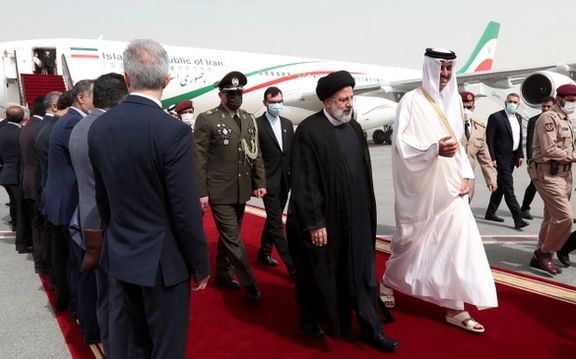
Iran and Qatar signed several bilateral deals on Monday during a visit by Iranian President Ebrahim Raisi to Doha to attend the Gas Exporting Countries Forum.
Raisi said that he hoped the trip would help improve ties with other Persian Gulf Arab states.
Raisi's visit, the first to Qatar by an Iranian president in 11 years, comes as the United States and Iran hold indirect talks aimed at salvaging a 2015 nuclear deal. Some Persian Gulf states, such as Saudi Arabia and the United Arab Emirates deemed the agreement flawed for not addressing Iran's missile program and arming of regional proxies.
"We believe that the level of existing cooperation between the countries of the region is not commensurate with potential ties," Raisi said in joint remarks with Qatar Emir Sheikh Tamim bin Hamad al-Thani.
Raisi who assumed office last August has made improving ties with regional countries a declared cornerstone of his foreign policy, but during his first six months he did very little to remove irritants that hinder closer ties with many countries.
"Iran seeks to enhance these relations as our goal is regional convergence," said the Iranian president, who will attend a gas exporters' summit in Doha on Tuesday.
Iran-backed Houthi forces in Yemen who have been fighting a Saudi-backed coalition for seven years have continued missile and drone attacks against Saudi Arabia, and in January began targeting the UAE.
Earlier, Qatar and Iran signed 14 memoranda of understanding in the fields of aviation, trade, shipping, media, cancellation of visa requirements, electricity, standards, education and culture.
"We have today expanded our cooperation in the fields of the economy, energy, infrastructure, culture and food security," Raisi said.
Qatar has good ties with Iran, with which it shares a giant gas field. Tehran supported Doha after Saudi Arabia and its Arab allies imposed a boycott on Qatar in mid-2017 in a dispute over its ties with Islamist groups and with non-Arab Turkey and Iran.
Qatar's emir said in the joint remarks that his US-allied country was ready to do what it can to help bring an agreeable solution between Iran and the major parties at talks in Vienna to salvage the nuclear deal, which Washington pulled out of in 2018.
Reports in January spoke of Qatar acting as a mediator to arrange direct talks between Tehran and Washington. But so far Iran has rejected negotiating directly with the US.
Raisi on Monday reiterated earlier statements by Iranian officials that US pressures and sanction have been defeated. President Joe Biden decided early in his presidency to return to the 2015 nuclear deal and began indirect talks with Tehran.
Iran's oil minister said on Monday that unilateral sanctions against members of the gas forum threaten global energy security and that Iran provided the best option for gas exports to east and west, the semi-official Tasnim news agency reported.
Iran has faced gas shortages at home because of record high consumption, particularly for winter household heating, and has had to cut supplies to cement plants and other industries.
With reporting by Reuters
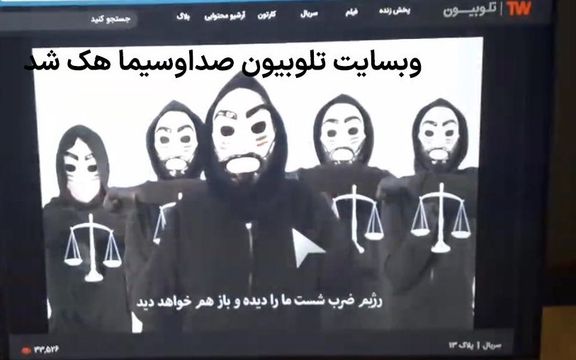
Cyber security provider Check Point has shed light on the new wave of cyberattacks that have hit Iranian state infrastructure in the past few months.
The American-Israeli software and hardware security company said in a comprehensive technical analysis published on February18 that the recent wave of attacks that caused major disruptions to public services are far from minor website defacements.
The report provided in-depth breakdowns for some of the attacks, including the targeted hack of the state broadcaster (IRIB) in late January, saying the attackers’ aim was also to disrupt the IRIB’s programs, with the damage to the TV and radio networks possibly more serious than officially reported.
Several television and radio channels of the state broadcaster were hacked on January 27 with photos of leaders of an opposition group briefly aired. The image of Massoud and Maryam Rajavi, leaders of the Albania-based opposition Mujahideen-e Khalq (MEK), were broadcast for around 10 seconds with audio footage from one of their speeches in the background.
After the picture of the MEK leaders, the video showed a photo of Iran’s Supreme leader Ali Khamenei with a red cross on it, as an off-camera voice said, “Death to Khamenei.” Khamenei was badly injured in 1981 in one of a series of bombings attributed to the MEK.
Check Point research team probed the cyberattack and was able to retrieve the files and forensic evidence from publicly available resources, finding malicious executables whose purpose was to air the protest message, as well as evidence that a wiper malware was used.
The security firm provided a technical analysis of the tools used in the attack, as well as the attackers’ tactics, identifying malware that takes screenshots of the victims’ screens, several custom-made backdoors, and related batch scripts and configuration files used to install and configure the malicious executables.
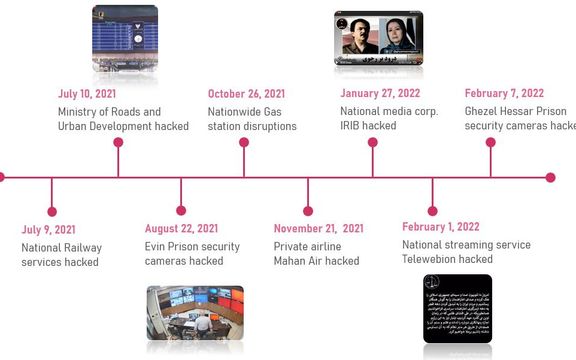
Check Point also gave a detailed report about other major cyber-attacks such as an attack that hit the Iranian national railway and cargo services in July 2021. The attack caused “unprecedented disruptions” to the country’s trains, a day before media outlets reported that the website of Iran’s Roads Ministry, in charge of transportation, was taken down in a ‘cyber disruption’, preventing access to their official portal and sub-services.
A message was also displayed on the train schedule boards referred perplexed passengers to the Supreme Leader’s office phone number.
A group called ‘Predatory Sparrow’ claimed responsibility for the attacks, whose tools and tactics were used in similar operations against private companies in Syria by an anti-regime group called Indra.
In August 2021, the hacktivist group Tapandegan (Palpitations), previously known for hacking and displaying protest messages on the electronic flight arrival and departure boards in Mashhad and Tabriz international airports in 2018, released security camera footage from Tehran's Evin Prison, where many political prisoners are held. Tapandegan said the images had been acquired by hackers called Edalat-e Ali (Ali's Justice) and were being circulated to draw attention to human rights violations, particularly against political prisoners.
In October 2021, all gas stations in Iran were paralyzed by an attack that disrupted the electronic payment process, leading to extremely long queues for two days that prevented customers from paying with the government-issued electronic cards used to purchase subsidized fuel. When the card was swiped for payment, the supreme leader’s office phone number appeared on the screen. Iranian officials claimed that foreign actors, such as Israel and the US, were behind the attack. However, Predatory Sparrow claimed responsibility for this attack as well.
On February 1, the web-based streaming platform of IRIB, Telewebion, was hijacked yet again to broadcast protest messages urging citizens to rebel and stating that “the regime’s foundations are rattling” in the middle of a live broadcast of the Iran-UAE soccer match.
Recently, on February 7, 2022, the Edalat-e Ali group released footage from closed-circuit cameras in another Iranian prison, Ghezel Hesar.
Check Point says it is still not clear how the attackers gained initial access to these networks that are “completely isolated, are equipped with acceptable security protocols and are not accessible via the Internet”.
It concluded that “the actor may have many capabilities that have yet to be explored. On the one hand, the attackers managed to pull off a complicated operation to bypass security systems and network segmentation, penetrate the broadcaster’s networks, produce and run the malicious tools that heavily rely on internal knowledge of the broadcasting software used by victims, all while staying under the radar during the reconnaissance and initial intrusion stages”.
Check Point also concluded that “the attackers’ tools are of relatively low quality and sophistication and are launched by clumsy and sometimes buggy 3-line batch scripts”, which supports their “theory that the attackers might have had help from insiders or indicate a yet unknown collaboration between different groups with different skills”.
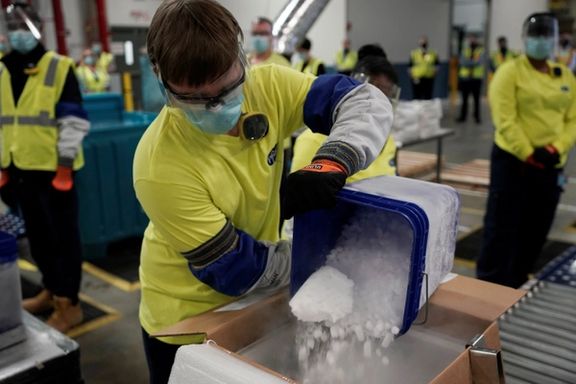
Iran is returning about 820,000 doses of AstraZeneca COVID-19 vaccines donated to the country by Poland presumably because they were made in the United States.
In a letter to the Customs Administration released to media on Monday, the Health Ministry said the vaccines were from "unauthorized sources" without mentioning they were made in the US. But Fars news agency affiliated with the Revolutionary Guard claimed the vaccines were returned because the were US-made.
The Biden Administration last year donated about 60 million doses of AstraZeneca to other countries because they were never used in the US.
According to the document the health ministry ordered the customs administration to return the last consignment back to Poland.
The Polish embassy in Tehran said in October that Poland was donating a million AstraZeneca COVID-19 shots to the Islamic Republic.
AstraZeneca is a British-Swedish multinational pharmaceutical and biotechnology company with its headquarters at the Cambridge Biomedical Campus in Cambridge, England.
Supreme Leader Ali Khamenei had banned the purchase of US and British-made vaccinesin January 2021, saying that "Importing vaccines made in the US or the UK is prohibited. They are completely untrustworthy. It is not unlikely that they would want to contaminate other nations… French vaccines are not trustworthy either”.
Health authorities, who have said the country is in its sixth wave of the pandemic, warn the figures are expected to increase exponentially during the next two months.
President Ebrahim Raisi has rejected proposals for a nationwide shutdown.